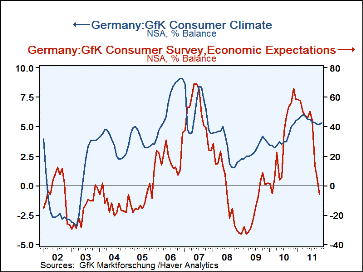 Global| Oct 25 2011
Global| Oct 25 2011German Consumer Climate Steadies While Economic Expectations Dive
Summary
In Germany consumer climate crawled a bit higher in an early read on November but has mostly stay around the current level for several months. Climate crested early in the year, it since moved lower and has moved sideways. Economic [...]
 In Germany consumer climate crawled a bit higher in an early read on November but has mostly
stay around the current level for several months. Climate crested early in the year, it since
moved lower and has moved sideways. Economic expectations have moved much more sharply (see chart).
Economic expectations peaked ahead of climate then dived and were still falling sharply as
climate itself peaked.
In Germany consumer climate crawled a bit higher in an early read on November but has mostly
stay around the current level for several months. Climate crested early in the year, it since
moved lower and has moved sideways. Economic expectations have moved much more sharply (see chart).
Economic expectations peaked ahead of climate then dived and were still falling sharply as
climate itself peaked.
Economic expectations have continued to plunge in recent months as the situation in Europe has remained up for grabs but overall climate in Germany has remained surprisingly steady.
The table also shows consumer evaluations in France, Italy and the UK. Whereas Germans rate their climate in the top 75% of its historic queue (% count), in Italy consumers evaluate it as being in the bottom 2.1%, in France in the bottom 9.7% in the UK in the bottom 12%. Germany is head-and-shoulders better off that these select EU member countries, at least according to how consumers say they feel.
In Germany the economic expectation is weak in the 34th percentile of its ranked queue of values, but income expectations are still strong as income expectations hover and continue to climb to the top 9% of their historic queue. German propensity to buy stands strong in the 77th percentile of its queue, within the top 25%, historically.
On balance Germany is still doing so much better than the rest of Europe. But Germany is not impervious to what is going on in the Zone. Since July the Germany Climate has been more or less steady while Italy has moved down sharply. France has moved down and the UK is sporting a deeply negative reading that is up-to-date only through September.
The troubles in the Zone are making things worse, and even though Germans are aware of the events and have been protesting many of the measures, not wanting to backstop the troubles elsewhere, elsewhere the economic situation is deteriorating fast. Germany is being sucked into this vortex with the economic climate rating taking the worst hit and the rest of it to follow if conditions in Europe continue to worsen. In the end the Greek Bone is connected to the Berlin Bone and there is no way around it. German consumers will not stay aloof if the mess in Europe is not cleaned up soon.
| Germany Consumer Climate Survey GFK | Other EU Members | ||||||
|---|---|---|---|---|---|---|---|
| Climate | Expectations | Propensity to | Consumer/Household Confidence | ||||
| Economic | Income | Buy | Italy:ISAE | France:Insee | UK:GFK | ||
| Nov-11 | 5.3 | -- | -- | -- | -- | -- | -- |
| Oct-11 | 5.2 | -6.2 | 36.5 | 31.2 | 92.9 | 82.0 | -- |
| Sep-11 | 5.2 | 4.8 | 35.1 | 29.7 | 94.2 | 80.0 | -30.0 |
| Aug-11 | 5.3 | 13.4 | 27.6 | 36.9 | 96.4 | 83.0 | -31.0 |
| Jul-11 | 5.4 | 44.6 | 34.6 | 34.1 | 99.9 | 85.0 | -30.0 |
| Current | Lagged One Month | 2Mo Lag | |||||
| Average | 4.6 | 11.1 | 5.3 | 7.6 | 100.4 | 90.2 | -14.4 |
| Max | 9.1 | 69.5 | 45.2 | 64.4 | 108.1 | 107.0 | 1.0 |
| Min | 1.5 | -32.9 | -20.5 | -41.7 | 91.1 | 77.0 | -39.0 |
| % Range | 50.0% | 26.1% | 86.8% | 68.7% | 10.6% | 16.7% | 22.5% |
| Count% | 73.4% | 34.0% | 91.5% | 77.7% | 2.1% | 9.7% | 14.0% |
| % range is current reading as a percentile of Hi/Low range | |||||||
| Count % is current reading ranked as a %-tile among all readings | |||||||
| GFK survey dates from January 2002 | |||||||
Robert Brusca
AuthorMore in Author Profile »Robert A. Brusca is Chief Economist of Fact and Opinion Economics, a consulting firm he founded in Manhattan. He has been an economist on Wall Street for over 25 years. He has visited central banking and large institutional clients in over 30 countries in his career as an economist. Mr. Brusca was a Divisional Research Chief at the Federal Reserve Bank of NY (Chief of the International Financial markets Division), a Fed Watcher at Irving Trust and Chief Economist at Nikko Securities International. He is widely quoted and appears in various media. Mr. Brusca holds an MA and Ph.D. in economics from Michigan State University and a BA in Economics from the University of Michigan. His research pursues his strong interests in non aligned policy economics as well as international economics. FAO Economics’ research targets investors to assist them in making better investment decisions in stocks, bonds and in a variety of international assets. The company does not manage money and has no conflicts in giving economic advice.






